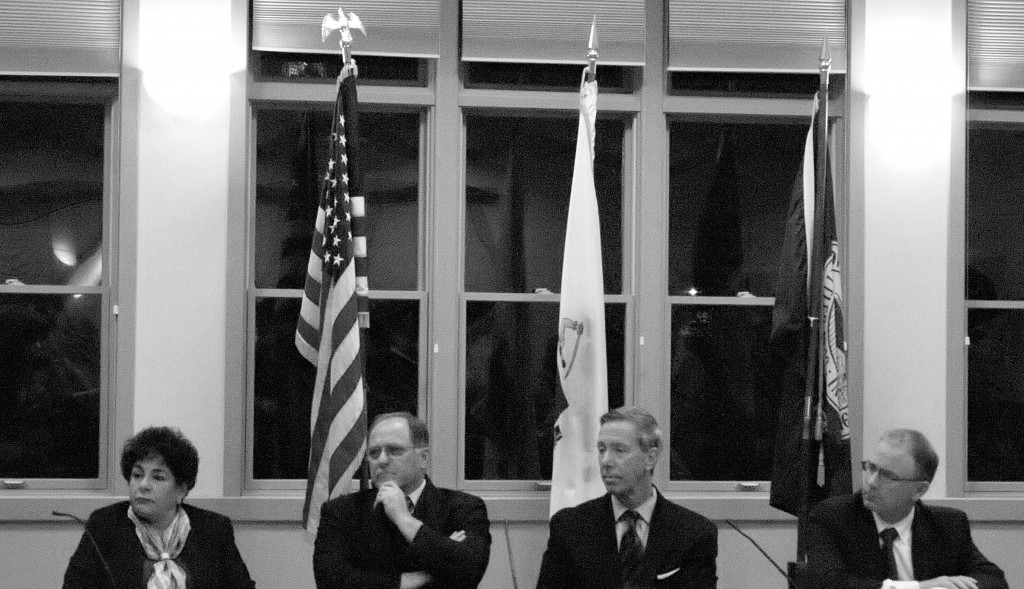by Frank Schroth
Michael Capuano and Stephen Lynch, two congressmen whose districts include portions of Milton, appeared at a forum last night to listen to and address resident concerns regarding the impacts of air traffic over Milton. Noise was the principal concern, but not the only one.
The meeting was organized by a local group, Milton Citizens Against Aviation Impact (MCAAI), co-chaired by Sheryl Fleitman and Phillip Joehenning. The session at the Council on Aging, which was filled to capacity, began with brief remarks from Denis Keohane, Chairman of the Board of Selectmen, and Ms. Fleitman. Residents were then invited to the table to ask questions of the congressmen.
The comments and questions essentially identified the stress and strain residents are feeling as a result of airplane impacts and what is going to be done about it. Several residents cited flights starting early in the morning and con tuning past midnight. Flights are flying in lower than allowed (i.e. 1200′ versus 1700′), and most significantly there are more of them. Changes in the technology for how flights are routed has resulted in more flights coming in on a tighter path and consequently resulting in more concentrated noise along a specific route. Diane DiTullio Agostino was among a couple residents who noted that noise was not the only problem. Ms. D’Agnostino suffers from chemical sensitivity and airplane emissions. particulates, and dumping all have an adverse impact. Daryl Warner compared the heavy airplane traffic to drones. “It’s torture,” he said and, citing lack of enforcement as a key problem in obtaining any relief, asked what the community working with elected officials could do about it.
Both Capuano and Lynch said working with the FAA was extremely difficult. Both represent districts that are heavily impacted by air traffic. Capuano’s distrct includes East Boston and Lynch’s South Boston. Capuano said that there was no way to get rid of the issue but that the impacts needed to be equally shared among commuities affected and Lynch acknowledged that Milton was enduring more that its fair share. They also noted that a noise study is underway and entering its third phase (you can find that study here); but that phase may not be done for some time. Lynch had requested a sit down with the FAA and MCAAI but the FAA refused to meet with MCAAI as they are party to a law suit. Lynch met with them alone. They spoke of the study underway and would not comment on the lawsuit.
Capuano noted that the pilot’s discretion was a factor in where and how flights came in. Lynch said it was not unlikely that pilots would take a certain runway over another due to proximity to the gate they are to pull into. Resident Paul Yovino questioned whether MassPort could restrict the number of flights permitted. Capuano said he was not aware of an ability on their part to limit flights.
The elected officials seemed to share the residents frustration. Two key issues are the altitude of flights and their frequency and complicating this is a lack of confidence in the data that is being supplied and captured. Co-chair read a note from Cindy Christiansen questioning the validity of methods being used to record sound. Ms. Christiansen, a professional statistician, believe the methods are faulty, the data is faulty and, consequently, any decisions based on the data are faulty.
In terms of what can be done several ideas were discussed. First, it is recommended that communities come together in a concerted effort to make a strong statement of their concerns to the FAA. Some neighboring communities have been relatively silent on the issue (e.g. Canton). Second, Capauano said that the new director of Massport was receptive to community concerns and that an effort should be made to work with him. He also said that in his experience the chances of success were better when there was a specific request rather than a scatter shot approach. There appeared to be some consensus forming that altitude and arrivals particularly to runway 4L were key issues and Senator Joyce felt that the BLANS effort could result in an agreement among the FAA, MassPort, and the CAC that had enforceable provisions regarding these issues. (BLANS is the noise study previously referenced, the CAC is the Citizen Advisory Committee which is composed of representatives from communities in the area affected by Logan traffic. Members of the CAC from Milton and Hyde Park were present at last night’s session.)
You can learn more about MCAAI here.

I would like to express a sincere thank you to Sheryl Fleitman and Phil Johenning as Co-Chairs of the MCAAI for all their time and hard work in getting this together.
Thank you both.
I would like to congratulate my daughter Sheryl and her committee for organizing this meeting.
She and the committee hav accomplished more in less than one year than the Selectman have done in 10!
Congratulations Sheryl and MCAAI!
Sheryl Fleitman and Philip Johenning have been able to do more in 6 months than the previous airplane noise committee did in the entire time of its existence.
And they are just beginning. I think the town has just awakened from a deep sleep on this issue and now realizes that the problem of airplane noise and jet fuel pollution in Milton is and will continue to hurt residential property values.
We need the realtors in Milton to step up to the plate as a unit and join the fight. A head in the sand attitude will not make this problem go away.
Congratulations again to Sheryl and Philip for a job well done and for their continued fight to reduce airplane noise and jet fuel pollution over the skies of Milton.